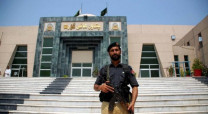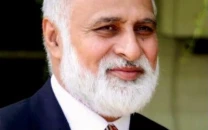How Pakistan and China fared during pandemic
Consistent policies, flexibility, and adaptability are the three keys to success

With the global economy in turbulence due to the Covid-19 pandemic, China, as the only country to show recovery, is in a novel position to lead the subsequent recovery.
China was the first county to be afflicted by the epidemic that has since submerged the entire world. It was also the first to manage its economy through a lockdown and engineer a recovery from the disruption brought on by the coronavirus. How it has fared carries lessons other countries would do well to heed.
Other countries, particularly the western governments, had opted for a different approach to the economic fallout from the pandemic than Beijing. They spent hundreds of billions of dollars on sustaining individual incomes – in Europe by covering salary costs for employers who keep workers employed, and in the US by radically boosting unemployment benefits. In contrast, China’s response, heavy on cheap credit, public investment and construction spending, has focused to a much larger extent on helping businesses, not workers.
Pakistan, learning from the Chinese experience tried to emulate some of the policies adopted by China to prevent and control the challenge of the novel coronavirus. Among those policies were the lockdown policy and the business supportive policies.
While Pakistan tries to incorporate the policy regime of China, one must understand the dynamics of the economic structure of the two countries to achieve desired results.
Shedding light on the economies of Pakistan, Sustainable Development Policy Institute (SDPI) Executive Director Abid Qaiyum Suleri said China’s economy is the second-largest economy of the world, while Pakistan’s economy is a struggling one, making the comparison a bit complicated.
While the world is watching China’s economic performance closely, it is a couple of months ahead of the rest of the world in coping with the virus and then trying to reopen businesses. Its successor stumbles could offer lessons to others.
With Prime Minister Imran Khan linking Pakistan’s economic future with China’s, there are three main lessons that Pakistan needs to learn from China to step on the road of progress, which include; consistency in policies, inclusive and flexible development models and adaptability to change.
China’s long-term policies were the major contributing factor to success in the economic recovery process. The economic reforms initiatives helped China to gain confidence, which resulted in an improved economic graph and helped overcome the Covid-19 shock to a much better extent.
Moreover, China is a vast country, having 23 different provinces with different geographic, social conditions. In this scenario, China didn’t rely on one specific recovery strategy. For different provinces and localities, the country developed different inclusive strategies as per the needs and demands of the local areas, however, keeping the basic purpose same for everybody.
This flexibility in recovery frameworks for different regions and putting economic recovery central to the overall comprehensive recovery strategies helped China overcome the economic shock.
Lastly, China has a development history to adapt to different changes around the world including industrial, technological and economic advancement. So this adaptability helped China to develop a comprehensive recovery strategy that resulted in lifting China out of the steep slump.
Pak-China economic ties during Covid-19
Speaking about the economic relationship between Pakistan and China, Suleri told The Express Tribune that to better understand the economic relationship between both the countries, “it is very important that we figure out the economic models of both the countries. While China has a centralised economy in Pakistan has a democratic economy.”
The social policy analyst was of the view that relations between China and Pakistan have strengthened during the Covid-19 pandemic but trade relations between the two countries during the pandemic were debatable.
“Both the countries stood by each other during these tough times, Pakistan’s President Arif Alvi was the first head of any state who visited China since the outbreak of Covid-19, which contributed to the strengthening relationship.”
However, according to Suleri despite there being no direct policy that Pakistan could adopt from China to recover as quickly as the later did, one decision that Pakistan took based on the practice of China was the lockdown policy.
“Pakistan among many other countries tried adapting the lockdown policy of China, and luckily Pakistan managed to flatten the Covid-19 curve.”
Highlighting the drawbacks on Sino-Pakistan’s economic projects he stated, “Another drawback that both the countries faced during the lockdown was the slowing pace of the China-Pakistan Economic Corridor (CPEC) projects, but I am sure with the new management and newly appointed CPEC authority the time missed can be recovered.”
The economist while suggesting ways to further boost economic ties between the two countries said, “The already signed Memorandum of Understandings (MoUs) between Pakistan and China should be made official. Relevant ministers and heads of the sector need to sit down and mutually decide a way forward.”
“Furthermore, instead of a government-to-government (G2G) approach, a business-to-business (B2B) approach should be promoted between both the countries for their private sectors to collaborate,” the analyst concluded.
The complete faith that Pakistan had on China and as the government of Pakistan despite all odds stayed true to its commitments and showed solidarity with China, providing support to its full capacity helped the iron brothers build a stronger bond during these many months.
China not only provided Pakistan assistance in the field of medicine during the pandemic, but it also made sure that the Pakistani counterparts working with Chinese investors and traders don’t suffer much.
Highlighting the support received from China Transsion Tecno Electronics Director Aamir Allawala said Chinese partners supported them by extending the tenure of their Usance Letter of Credits from 30 days to 150 days.
However, discussing the challenges faced, Allawala informed The Express Tribune that due to Covid-19, the supply chain of parts and components was disturbed because of the strict lockdown imposed in China.
“Moreover, concerning the technical support, our resident Chinese engineers were stuck in China as they went for Chinese New Year holidays in February and could not return to Pakistan for three to four months,” he lamented.
The trader was of the view that to further strengthen the bilateral ties between the two neighbouring countries, it was very important for the government to understand the importance of attracting foreign investment to Pakistan as the next phase of CPEC project.
“We need to welcome the formation of joint ventures between companies in both the countries and the government must encourage import substitution of goods currently being imported from China,” he added.'
The writer is a sub editor of the business desk



















COMMENTS
Comments are moderated and generally will be posted if they are on-topic and not abusive.
For more information, please see our Comments FAQ